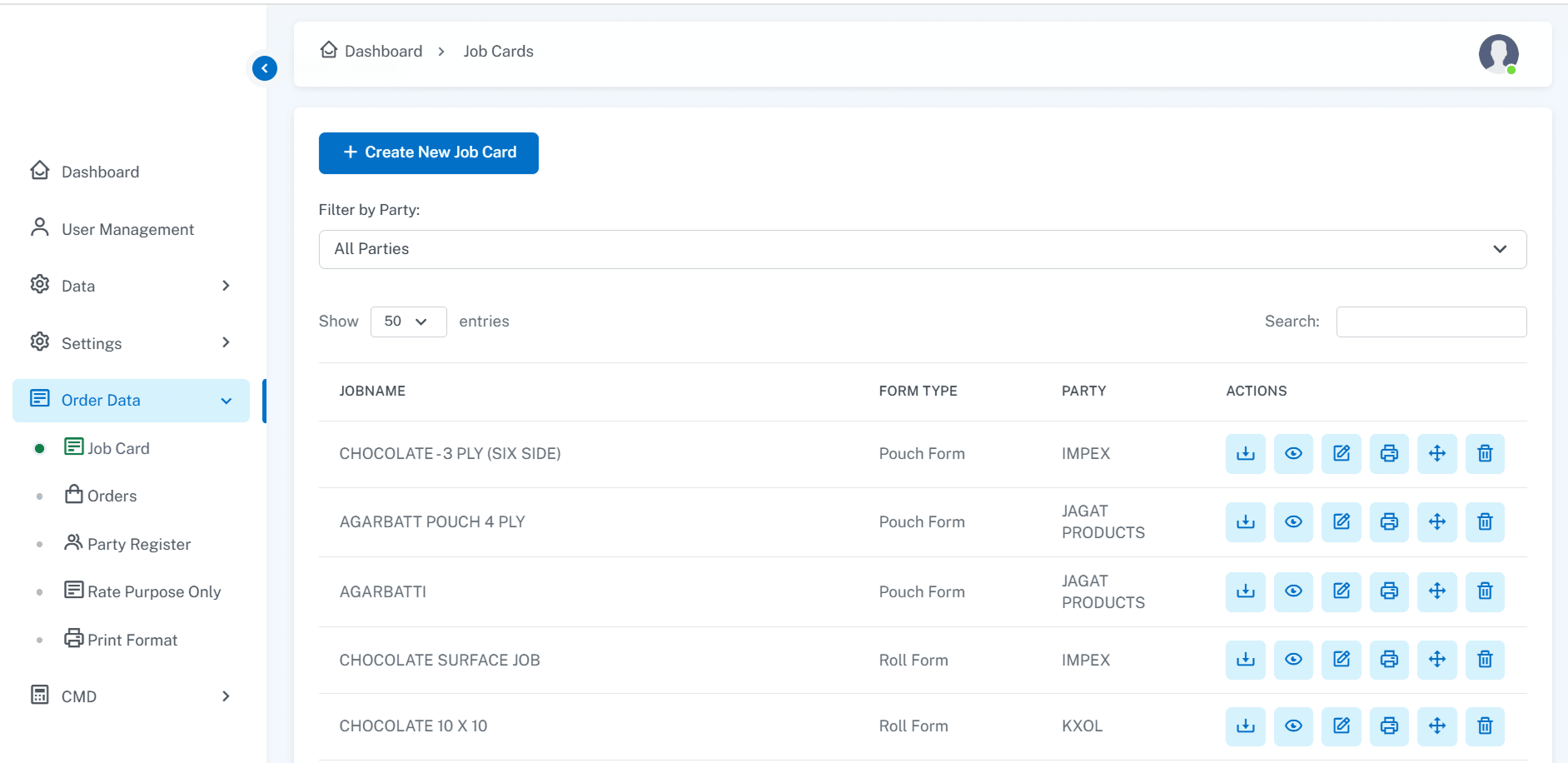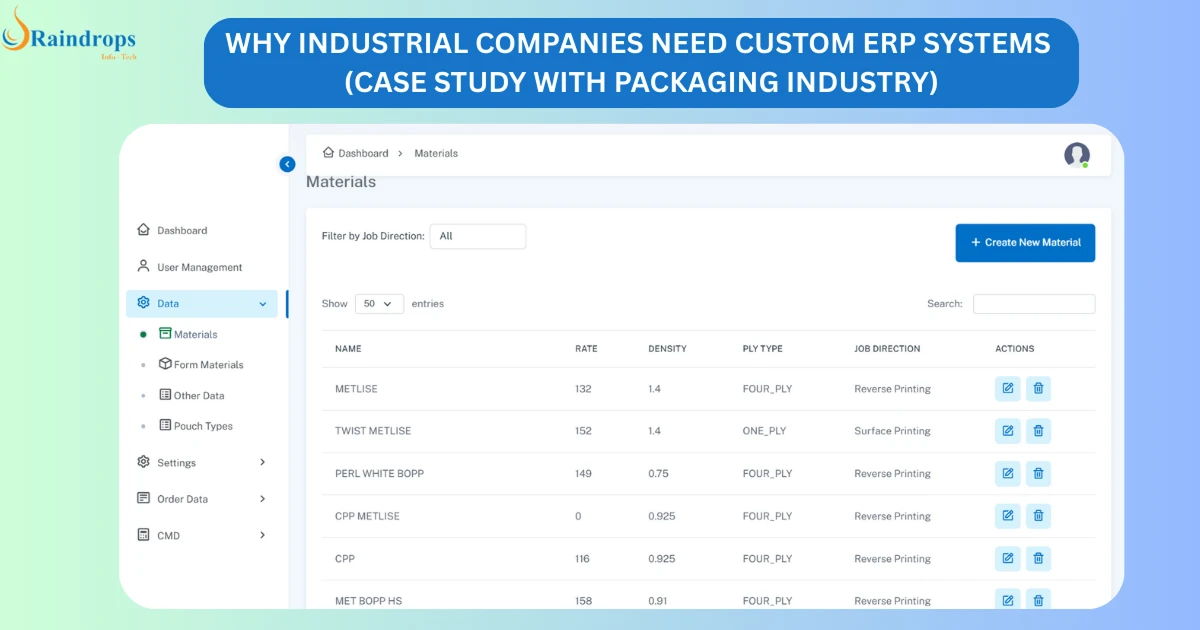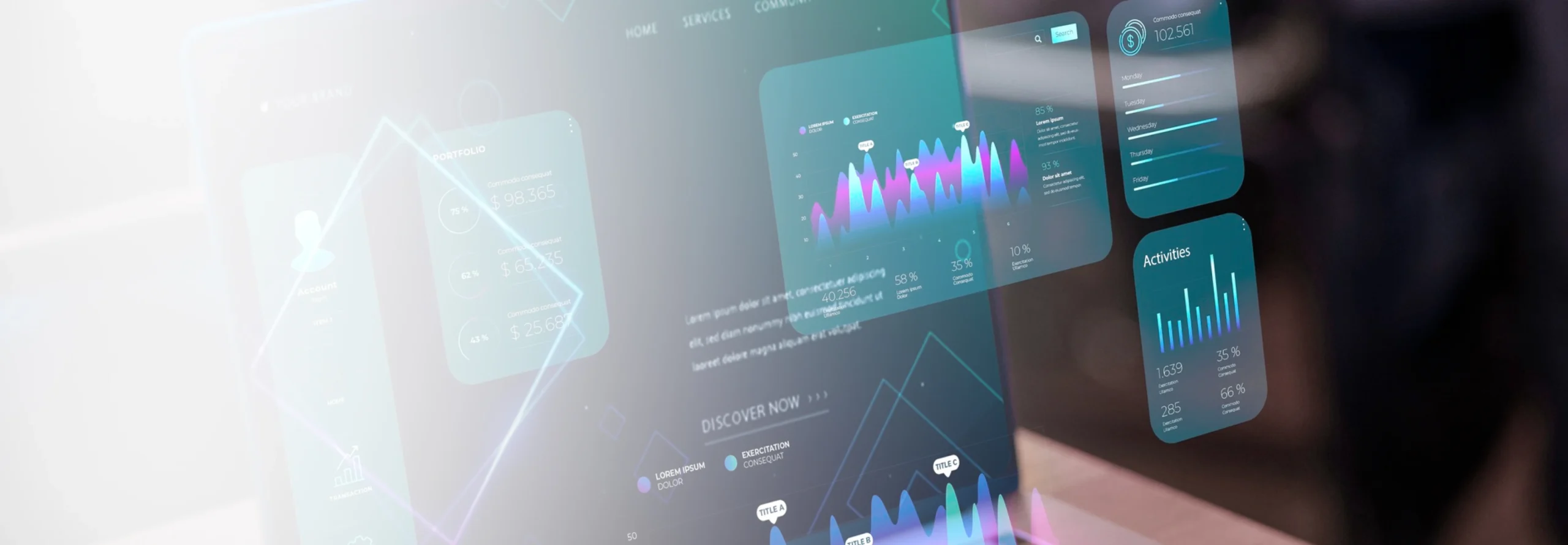Running a growing industrial business on Excel sheets?
Our client was too.
At first, it worked- simple, easy, and familiar. But as more orders, custom jobs, and client changes piled up, things started getting complicated. Costing errors, delivery delays, tracking confusion and a constant fear of “what if someone deletes the wrong file?”
That’s when they realized: Excel was holding them back. They needed something smarter, faster, and built for their kind of work.
That’s where we stepped in, building a custom ERP system that changed everything.
Here’s the full story.

The Common Problem in Industrial Sectors
Most medium to large-scale factories, especially in packaging, manufacturing, and industrial production, still manage key operations through manual processes or Excel sheets. At first, it seems easy:
-
Maintain job cards manually
-
Track costing in spreadsheets
-
Issue invoices by hand
-
Depend on specific employees for managing codes and processes
But what happens when those key employees leave? Or when the data becomes too messy to manage? Or when clients start expecting real-time updates and faster operations?
That’s when businesses realize that they need a solid ERP system.
Meet Our Client: A Leader in Flexible Packaging
Our client is a major player in flexible packaging, supplying pouches and packaging materials to big brands like Everest Masala, Balaji, and many others. Their factory produces different types of plastic pouches, laminated rolls, and packaging materials customized for each client’s specific needs like:
-
Material thickness
-
Size specifications
-
Design requirements
Earlier, they managed everything manually through Excel, but it was becoming a nightmare as they scaled up.
The biggest challenge?
Every time a manager resigned, a huge knowledge gap was created. Processes weren’t documented systematically, and new hires took months to understand the flow. They needed a way to systematize their operations, without depending on individual memory or Excel sheets.
The ERP Solution We Designed (Simple, Powerful, and Custom)
We didn’t just build a generic ERP. We custom-built an ERP system specifically tailored to their industry and workflow. Here’s what we implemented:
Job Card Management
- Every order (like 1000 pouches of Everest Masala) generates a job card.
- The job card tracks material used, thickness, size, and special instructions.
Costing and Rate Calculator
- Automated rate calculation based on material type, size, and quantity.
- No need to manually check or guess costing anymore.
Invoicing Integration
- Once costing is finalized, invoices are generated automatically.
- No back-and-forth between finance and operations.
Cylinder Calculation and Line Reference Tracking
- For printing and packaging, cylinder data is automatically calculated and linked.
Material Management
- Different materials (like plastic grades) are tracked precisely.
- Variations in material type are reflected in costing and production tracking.
Profitability Reports
- Managers can instantly check how much material was used, cost involved, and profit earned per job.
Plus, we converted all their traditional Excel-based systems into a secure, web-based ERP, so no more juggling with hundreds of scattered spreadsheets!
How would this help their business?
By implementing a custom ERP system for industrial companies, [Client Name] is set to unlock major improvements across their operations. Here’s how:


1. Productivity Will Increase Significantly

With automation and real-time insights, the teams would be able to handle more orders without feeling overwhelmed. Key advantages they can expect:
-
Fewer Errors: Costing mistakes, job tracking confusion, and material mismanagement will reduce drastically.
-
Better Planning: Production schedules can be created based on actual capacity insights and not guesswork.
Moving away from their current ERP for Excel-based operations will remove bottlenecks and manual slip-ups.
2. Lower Employee Dependency

Today, every time a new employee joins, weeks are spent training them on complex Excel processes. With a custom ERP for packaging industry:
-
Standardized workflows will guide employees step-by-step.
-
New joiners will require less handholding.
-
Critical knowledge won’t be trapped inside a few senior employees’ heads anymore.
The ERP system will act as an internal trainer, reducing dependency and improving business continuity.
3. Faster Client Service and Better Turnaround

Speed = client satisfaction = more business. With a well-designed industrial ERP software India, the client would:
-
Share quotations and cost estimates in minutes.
-
Provide real-time updates on job status to customers.
-
Plan deliveries faster, with better coordination across production and dispatch.
This responsiveness would strengthen client trust and increase repeat orders.
4. Improved Data Security

Currently, their critical data is scattered across Excel files on different systems which is a huge risk. Implementing a centralized ERP system will:
-
Protect business data with role-based access control.
-
Offer regular auto-backups to prevent accidental losses.
-
Safeguard intellectual assets like pricing models, customer details, and vendor contracts.
Security won’t be an afterthought anymore , it will be built into daily operations.
What a Custom ERP System Brings to the Table?
-
Standardization Across Your Processes: A custom ERP for packaging industry or manufacturing units enforces consistent, standardized workflows across departments.Everyone follows the same process, leading to fewer errors, faster execution, and better scalability.
-
Visibility Across Departments: When departments work in silos using disconnected Excel files, small miscommunications can snowball into big losses. An industrial ERP software India connects all teams onto a single platform. Sales, production, inventory, and management all stay aligned in real time.
-
Real-Time Data for Faster Decision-Making: With Excel, decision-makers often act on outdated information. An ERP system provides live dashboards and automatic reports, helping management identify issues early, allocate resources efficiently, and respond faster to market changes.
-
Security for Your Intellectual Assets: Your costing strategies, customer databases, material sourcing methods: these are critical business assets. With a centralized ERP, you safeguard sensitive data with advanced security protocols, ensuring it is accessible only to authorized personnel. The risk of data loss due to accidental file deletion, employee turnover, or cyber threats is significantly reduced.
-
Better Client Service and Accelerated Growth: With a streamlined ERP system, quotations are sent faster, orders are fulfilled more accurately, and delivery schedules are managed seamlessly. This leads to improved client satisfaction and opens up new growth opportunities.
What a Custom ERP System Brings to the Table?
This project clearly proves one thing: A customized ERP is not a luxury, it’s a business necessity for industrial companies aiming for sustainable, scalable growth. Whether you are a factory in Gujarat, Maharashtra, or any other industrial hub in India, if your operations are still running on Excel sheets, you are holding your business back.
It is time to eliminate inefficiencies, reduce risks, and prepare your business for the future with a robust, industry-specific ERP solution.
At Raindrops Infotech, we specialize in building custom ERP systems for industrial companies, suited to your exact processes, materials, and client demands. Ready to transform your business operations? Schedule a free consultation with us today to discuss how we can help you achieve higher productivity, stronger data security, and faster growth.






